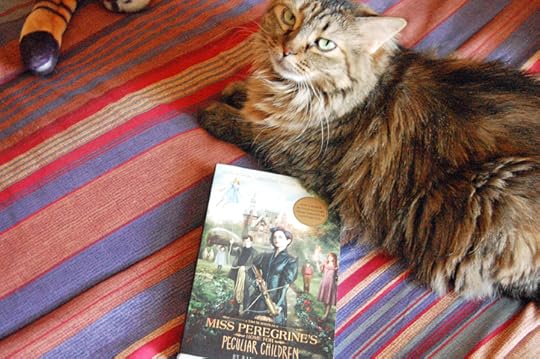FF: Wonderful Extras
 Mei-Ling Pounces
Mei-Ling PouncesSerendipitous this week was how much of my reading contained opportunities to reflect not just on the stories but on the different ways stories are told, and how publication concerns can impact a tale. See below for details.
For those of you unfamiliar with this column, the Friday Fragments lists what I’ve read over the past week. Most of the time I don’t include details of either short fiction (unless part of a book-length collection) or magazines. The Fragments are not meant to be a recommendation list. If you’re interested in a not-at-all-inclusive recommendation list, you can look on my website under Neat Stuff.
Once again, this is not a book review column. It’s just a list with, maybe, a bit of description or a few opinions tossed in. I was glad to see some of the frequent commenters back again with really interesting reading lists.
Completed:
Miss Peregrine’s Home for Peculiar Children by Ransom Riggs. Not sure why many reviewers thought this “unique” and “original” as I’ve been able to call every plot point and the characters fit defined tropes. That said, well-written, especially the narrator’s internal journey.
Agatha Christie: The Lost Plays. Audiobook. Three plays written for radio. They were good, but the wonderful extras on this audiobook were several interviews and speeches—including several by Christie and one by one of the radio drama actors—were included. These were all excellent and provided some fascinating details.
Unexpected Guest from a play by Agatha Christie, adapted to a novel by Charles Osborne. Interesting choices that leave the underlying bones of the play quite visible.
The Golden Ball and The Hound of Death by Agatha Christie. Audiobook. Two short story collections, one focused on more or less normal people and their moral and ethical challenges. The other definitely tinged with supernatural elements.
The Magic Talisman by John Blaine. (A Rick Brant Science-Adventure Story.) Written in the late 1960s and probably intended to be the closing book in the series, this was not published until 1989. In the late 1960s, ESP was still considered a legitimate “SF” topic. However, although the book does have it, it also has some really neat material on other material. Also interesting was the theme of the female characters insisting on having a role, something that would have been unheard of when the series began in 1947. Another “wonderful extra” this week was the afterpiece by Hal Goodwin, the author, in which he goes into the details of the book’s publication history
In Progress:
The Spirit Ring by Lois McMaster Bujold. An early venture into fantasy, this contains an after piece about some of the influences on the novel.
The Dictionary of Imaginary Places by Alberto Manguel and Gianni Guadalupi. Illustrated by Graham Greenfield with maps and charts by James Cook. This 1980 tome is a delight, encompassing everything from speculative utopias (and dsytopias) to OZ to works by LeGuin, Tolkien, and Lovecraft. Articles are presented in a “tour guide” fashion, rather than being dryly academic. Nicely indexed.
Also:
A few Sherlock Holmes short stories in audio, and a marvelous article on the role of cats in Japanese culture, folklore, and mythology.



